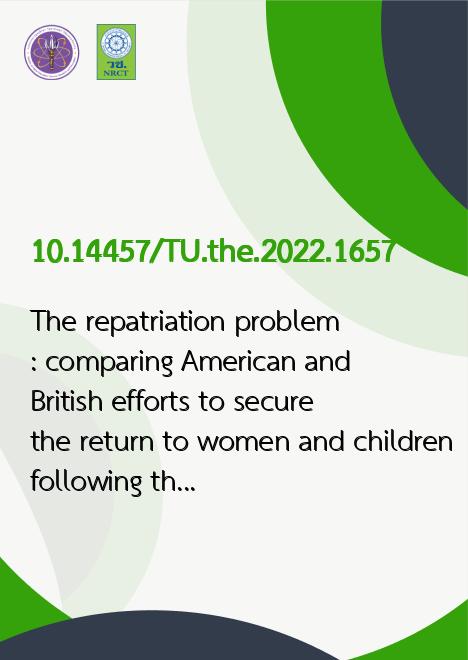
|
The repatriation problem: comparing American and British efforts to secure the return to women and children following the fall of the Islamic state of Iraq and Syria (ISIS) |
|---|---|
| รหัสดีโอไอ | |
| Title | The repatriation problem: comparing American and British efforts to secure the return to women and children following the fall of the Islamic state of Iraq and Syria (ISIS) |
| Creator | Maria Rowat |
| Contributor | Charlie Thame, Advisor |
| Publisher | Thammasat University |
| Publication Year | 2565 |
| Keyword | Repatriation, ISIS, United States, United Kingdom, Women and children, Security perspectives, International human rights law, Citizenship, Rights of the Child, Islamophobia |
| Abstract | This independent study provides a comparative study of American and British approaches to the issue of repatriating women and children from detention camps in Northern Syria following the fall of the Islamic State of Iraq and Syria (ISIS). While the United States has been proactive in repatriating American citizens from Northern Syria, the United Kingdom has taken a much harsher stance, instead choosing to deny repatriation to most women and children, with minor exceptions. The United Kingdom has also gone as far as revoking citizenship from former British citizens, even in cases where the individual has been rendered stateless. This difference is notable, given the historically close relationship between the U.S. and the U.K., their shared democratic institutions and values, and near lock-step cooperation in the “Global War on Terror.” This research explores the underlying reasons for this divergence in approaches by undertaking a comparative study of secondary sources. It was found that the differing security contexts between the U.S. and the U.K. appeared to have the most influence over how each country approached the issue of repatriating women and children. It has also been found that while Islamophobia is prevalent in both countries, it appears to have had a much greater effect on repatriation policy in Britain, while it does not appear to have exerted any influence on American repatriation policy. |